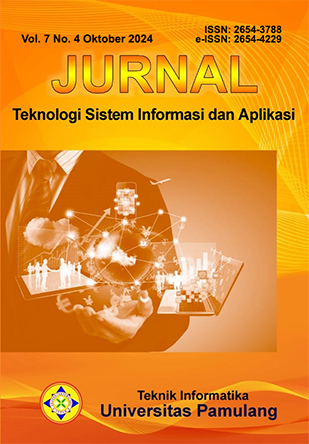The Role of Information Systems in Student Organizations at Satya Wacana Christian University
DOI:
https://doi.org/10.32493/jtsi.v7i4.45219Keywords:
Information Systems; Student Organizations; Data Management; Event CoordinationAbstract
Information systems have become an integral component in supporting the operations of student organizations at Satya Wacana Christian University (UKSW). These systems are designed to streamline data management, enhance communication, and improve operational efficiency, ultimately supporting academic and extracurricular activities. Despite their potential, the implementation of information systems in student organizations faces challenges, including technical limitations and resistance to change. This qualitative study employed a case study approach to explore the role, supporting factors, and challenges of information systems in student organizations at UKSW. Data were collected through in-depth interviews with three student leaders, document analysis, and observation. A thematic analysis method was used to categorize and interpret the data, providing a comprehensive understanding of the system's impact and areas for improvement. The findings reveal that information systems significantly improve the efficiency of data management, event coordination, and communication among student organizations. Centralized data systems facilitate task distribution and enhance transparency and accountability. However, challenges such as technical limitations among students, system bugs, and inconsistent updates hinder optimal utilization. Strong institutional support, active student involvement, and continuous training were identified as critical enablers of successful implementation. The study highlights the need for improvements in user training, technical support, and system interactivity to overcome challenges and maximize the benefits of information systems. Recommendations include increasing system user-friendliness, ensuring regular updates, and fostering collaboration between IT teams and student organizations. These steps are crucial for enhancing system adoption, engagement, and overall effectiveness.
References
Aswati, S., Mulyani, N., Siagian, Y., & Syah, A. (2015). Peranan Sistem Informasi dalam Perguruan Tinggi. Jurnal Teknologi Dan Sistem Informasi, 1(2), 79–86.
Bratha, W. (2022). Literature Review Komponensistem Informasi Manajemen: Software, Databasedan Brainware. JEMSI: Jurnal Ekonomi Manajemen Sistem Informasi , 3(3), 344–360.
Eko Nugroho, F. (2016). Perancangan Sistem Informasi Penjualan Online Studi Kasus Tokoku. Jurnal SIMETRIS, 7(2).
Landjamara Ndjurumana, F., Mailoa, E., & Kristen Satya Wacana Jl Notohamidjojo, U. O. (2020). Rancang bangun Sistem Informasi Kerjasama Universitas Kristen Satya Wacana. AITI: Jurnal Teknologi Informasi, 17(Agustus), 86–103.
Manurung, R., & Manuputty, A. D. (2020). Perancangan Sistem Informasi Lembaga Kemahasiswaan Universitas Kristen Satya Wacana Salatiga. Jurnal Sistem Informasi dan Tenologi, 3(1), 9–20. http://www.jurnal.umk.ac.id/sitech
Marwadi, T., & Ikasari, H. (2023). Peran Sistem Informasi Manajemen dalam Meningkatkan Efisiensi Operasional pada Perusahaan Skala Menengah. Jurnal AI Dan SPK : Jurnal Artificial Inteligent Dan Sistem Penunjang Keputusan, 1(1), 135–139.
Munazar, A. (2019). Pengembangan Sistem Informasi Biro Kemahasiswaan dan Manajemen Organisasi Kemahasiswaan di Universitas Widyatama. Universitas Widyatama.
Pangaribowo, N., & Kristianingsih, S. (2023). Hubungan Strategi Coping dengan Perilaku Merokok pada Mahasiswa Universitas Kristen Satya Wacana. Innovative: Journal of Social Science Research, 3(4), 1–14.
Prabowo, M. (2020). Metodologi Pengembangan Sistem Informasi. Lembaga Penelitian dan Pengabdian kepada Masyarakat (LP2M) IAIN.
Sujarwo. (2017). Peran Lembaga Kemahasiswaan Fakultas Dakwah Dan Komunikasi Uin-Su Dalam Menciptakan Keharmonisan. Universitas Islam Negeri.
Supriyanto, E., & Ismawati, N. (2019). Sistem Informasi Fintech Pinjaman Online Berbasis Web. Jurnal Sistem Informasi, Teknologi Informasi Dan Komputer, 9(2), 100–107. https://jurnal.umj.ac.id
Downloads
Published
How to Cite
Issue
Section
License
Copyright (c) 2024 Theofan Delano, Hanna Prillysca Chernovita

This work is licensed under a Creative Commons Attribution-NonCommercial 4.0 International License.
Authors who publish with this journal agree to the following terms:
- Authors retain copyright and grant the journal right of first publication with the work simultaneously licensed under a Creative Commons Attribution License that allows others to share the work with an acknowledgement of the work's authorship and initial publication in this journal.
- Authors are able to enter into separate, additional contractual arrangements for the non-exclusive distribution of the journal's published version of the work (e.g., post it to an institutional repository or publish it in a book), with an acknowledgement of its initial publication in this journal.
- Authors are permitted and encouraged to post their work online (e.g., in institutional repositories or on their website) prior to and during the submission process, as it can lead to productive exchanges, as well as earlier and greater citation of published work (See The Effect of Open Access).
Jurnal Teknologi Sistem Informasi dan Aplikasi have CC BY-NC or an equivalent license as the optimal license for the publication, distribution, use, and reuse of scholarly work.
In developing strategy and setting priorities, Jurnal Teknologi Sistem Informasi dan Aplikasi recognize that free access is better than priced access, libre access is better than free access, and libre under CC BY-NC or the equivalent is better than libre under more restrictive open licenses. We should achieve what we can when we can. We should not delay achieving free in order to achieve libre, and we should not stop with free when we can achieve libre.
This work is licensed under a Creative Commons Attribution-NonCommercial 4.0 International (CC BY-NC 4.0) License
YOU ARE FREE TO:
- Share - copy and redistribute the material in any medium or format
- Adapt - remix, transform, and build upon the material for any purpose, even commercially.
- The licensor cannot revoke these freedoms as long as you follow the license terms



_2020_-_7(2)_2024_-_Thumbnail.png)












